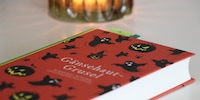
Review: Children of the Platzspitz, a good story badly told
"Children of the Platzspitz - My Mother, Drugs and Me tells the story of life with a drug-addicted mother. Drugs and the Platzspitz promise drama and tension, but unfortunately the book doesn't deliver.
"Children of the Platzspitz - My mother, drugs and me" tells the story of Michelle Halbheer's life and was written by a pen-pusher, journalist and author Franziska K. Müller.
In her book, Franziska K. Müller recounts the childhood and adolescence of former MusicStar contestant Michelle Halbheer. Michelle grew up with a drug-addicted mother.
"Children of the Platzspitz" documents a period of contemporary Swiss history. In a way, this book is our "Me, Christiane F., 13 years old, drug addict, prostitute...". It's part of the story of a population group that has attracted worldwide attention: a park in the heart of Zurich occupied by junkies tolerated by the authorities. "Children of the Platzspitz" shows what it was like to grow up alongside one of these lost souls.
This book is a historical document, but is very difficult to read. It is full of mistakes. Worse still: many sentences never end and get lost somewhere in the middle, never to find their way back to the beginning of the story. There's a red thread missing, even though it should be obvious in the chronology.
A childhood like no one should have
Michelle grows up in an environment riddled with drug addiction. Her daily life is summed up as suffering from hunger, from a mother whose drugs make her violent, manipulative and irascible. Irregular teeth, dirt, flea bites and thinness describe her physically.
At thirteen, I wore eight-year-olds. The sleeves stopped above my elbows and the trousers came up to my ankle.
For a short time, Michelle's mother was clean, but she was diagnosed with HIV. Heroin, cocaine, methadone and other drugs - in the book, the list is never exhaustive - are back in her life.
When Michelle is seven, her mother, Sandrine, divorces her. Michelle stays with her. Her father is affected, he doesn't understand. Manipulated into making decisions, Michelle is under the influence of her drug-addicted mother. She sleeps on a dirty mattress in the only habitable room in her flat. Her mother is glistening with sweat and reeks of drugs.
Michelle has two people in her life to give her strength: her father and her grandmother. But they, too, are powerless in the face of the family's slow descent into hell.
It wasn't until she was 15 that Michelle finally escaped the hell of drugs. She comes from a family belonging to the Free Church. They may have money, but their vision of the world and of women is shaped by religion. Michelle turns her back on religion and moves out.
In Michelle's life, music has always been an important part. It's not mentioned in the book, but Michelle trained as a singer, danced at the Goa Festival and appeared on the Swiss German TV show MusicStar.
Michelle's life has always been shaped by music.
No links, let alone a red thread
I don't think you read "Children of the Platzspitz" for the beauty of the words. Language-wise, the book is as inedible as Michelle's childhood.
Although "The Children of the Platzspitz" can be considered a historical document, important information is missing:
- What's going on
?- Who is involved in this affair?
- Where is all this happening?
- When are the events taking place?
- How does it all end?
- Why is this happening?
- What are the possible sources?
The red thread is completely absent from the book. Often, as a reader, you don't know where you are chronologically speaking. Or even where the story is taking place. People or animals, who seem to be important players, are only half introduced, if at all, or only when they disappear two sentences later. For example, Michelle's dog, which, in a fit of malice, her mother gives to someone else to hurt Michelle's feelings. But which dog are we talking about? Apparently, the one she holds dearest to her heart. Why didn't Franziska K. Müller present Michelle's dog on the day she moved in rather than the day she left?

Major parts of Michelle's life are missing. Michelle's great passion for music is only mentioned at the beginning and end of the book. The book does not hint at any companions in Michelle's life. We are talking about Michelle Halbheer, a woman who worked her way through the final rounds of a TV casting call. Without talent, none of this would have happened. Michelle had to listen to and perform songs before she got to this point. She had to sing while her mother was tripping, a needle in her arm, next to her. A tragic image. But in the book, this vocation, this career, plays only a marginal role.
The title "Platzspitzbaby" (original title) is at least as misleading as the book's chronology. Platzspitz Park, or "needle park", is briefly mentioned at the very beginning of the book. Michelle still lives in houses, stinking, disgusting shitholes they may be, but at no point is there any reference to the Platzspitz or to life on the streets. And by the way: none of these houses are in the city of Zurich. Except perhaps the shack at the very beginning of the book, but I can't be sure. The word 'Zurich' never appears in the book. On the other hand, "zurichois" appears twice in connection with the Oberland.
On the importance of the beauty of language
The problem lies not in the story, but in the words. The long, jumbled sentences, which sometimes run on for several lines, and the strange time jumps disrupt the flow of the reading. The book is written in the past tense. As a reader, this is enough to distance you completely.
Throughout the book, you can read the word "buk" three times (in the original German version). This preterite of the verb "backen" is completely obsolete. Nobody uses this word any more, except Franziska K. Müller and the Duden.

Furthermore, Franziska K. Müller's language choices are unclear. Despite Michelle's stated desire to publish a book that she can sell on the German market, the author has made linguistic choices that leave me perplexed. She certainly uses the Eszett, "ß", only used in Germany and Austria, but then adopts typically Swiss expressions, which are in fact incorrect uses of standard German. These may be details, but they make for difficult reading.
"The Children of the Platzspitz" is a tragic and wonderful story at the same time. A story well worth reading. But in the book, you don't really feel the suffering in Michelle's life. The length of the sentences and the many commas do nothing to help the understanding of the story.
The author
A few words about the author and prête-plume. It is entirely possible that this book is not her best work, that Franziska K. Müller actually writes without spelling mistakes or grammatical weaknesses. So I imagine the problem lies with the business model for private biographies.
On her website, Ms Müller offers her services as a professional author. This means she has to write X number of books a month in order to earn a living. We all have to pay the bills. Fair enough. It's pay per assignment, sounds tough.
A book that meets professional standards, tells exciting stories and is well written
This means that it can probably only give a story the time and space it deserves in individual cases. But a good story needs it. From the length of the sentences, the lack of structure and the spelling mistakes, I'm guessing it hasn't been proofread according to the four-eyes principle. Lack of time?
Franziska K. Müller makes mistakes. So do I, but my proofreader makes them disappear. She misspells the name of the musician Manfred Mann, which becomes "Manfred Man". Google would have done better, as would any spellchecker. She didn't have time to do a quick Google search?
These are little details that get lost when you're taking quick notes. You won't see the first version of my text, my proofreader is revising it and I hope he can eradicate all the typos and misplaced commas. This should always be the case before a text is published.
With regard to "The Children of the Platzspitz", unfortunately it cannot be described as an "exciting and well-written" story. Shame.

My world moves in 25 frames per second. As a journalist, I report – not because I can, but because I can’t help myself. After all, the world is full of stories that are waiting to be told. Adventures don't wait. From national to international news, hand me a camera and a mic and I've got it covered.


